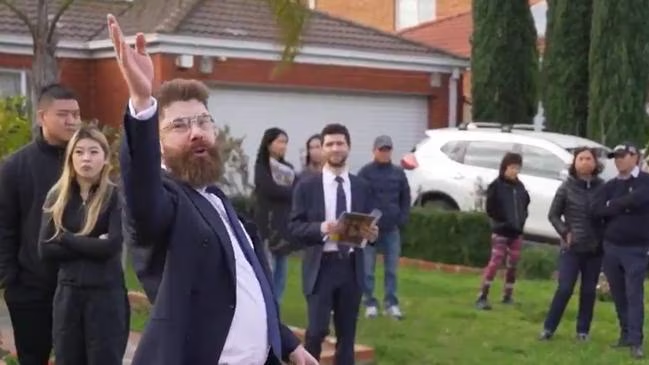
A video of a Melbourne property auction recently went viral, leaving many Americans bewildered and curious.
Hundreds of thousands of viewers expressed shock at what they called our 'insane' way of buying homes.
But for Australians, particularly those who remember weekends spent hopping between auctions, this reaction highlighted a striking cultural divide.
Melbourne: The property auction capital
Melbourne has long held the reputation as the property auction capital of the world, with most homes sold via auction throughout the 20th century and continuing today.
What Americans see as chaotic and high-pressure, many Australians view as weekend entertainment—and it has a rich history that explains why.
The tradition dates back to the gold rush era.
Robert Hoddle was appointed as auctioneer for the first sale of crown land in Melbourne on 1 June 1837, selling half-acre allotments for £18 to £78—prices considered expensive even then.
Melbourne has maintained its reputation as a hub for property auctions ever since.
How Australian auctions differ
Property auctions arrived with British settlers, but Australians, particularly in Melbourne, embraced them with unique enthusiasm.
Unlike most US auctions, where properties are sold in bulk at central locations, Melbourne house auctions occur individually at the property site and are promoted as major events by real estate agents.
'We all begin our weekends with brunch, smashed avo on toast, and then attend an auction where young aspiring couples looking for a 1st home are out-bid by investors buying their 4th property.'
Americans often find the auction system 'insane' because of its different cultural context.
Property auctions in the US are usually linked to financial distress, including foreclosure sales, tax defaults, or bulk liquidations, which historically carried a stigma.
Seeing hundreds of people gathering in a Melbourne driveway, cheering as bids climb past $1.32 million, is completely foreign to that experience.
The viral video showed auctioneer Marcus Fregonese taking rapid-fire bids from an enthusiastic crowd at a Sunshine West property.
For Australians, this is normal Saturday entertainment.
For Americans, it looked like organised chaos.
Understanding the auction experience
Australian property auctions can be bewildering for the uninitiated.
Bidding is public, and if the hammer falls and you are the highest bidder, you must sign the contract immediately.
No further bids can be made, and the highest bidder is legally obliged to sign and exchange contracts on the spot.
Key auction terms for international viewers
Reserve price: The minimum price the seller will accept
Vendor bid: A bid placed by or on behalf of the seller
Passing in: When bidding fails to reach the reserve price
On the market: When bidding exceeds the reserve price and the property will definitely be sold
The theatre of Australian auctions
For many Australians, auctions are a form of theatre.
Property expert Michael Yardney explained that 'Australians love going to auctions—they see it as a bit like buskers and street theatre, and they love to see what's happening to properties in their locality.'
This social aspect is especially strong among older Australians who recall attending auctions as a regular weekend pastime.
What seniors should know about property auctions
- No cooling-off period means decisions are final
- Deposit (usually 10 per cent) must be paid immediately
- Extensive preparation and research is essential
- Consider hiring a buyer's agent if the process feels overwhelming
Numbers behind the spectacle
Despite the viral nature of the footage, not all Australian homes are sold at auction.
Michael Yardney noted that only a fraction of properties actually go under the hammer, with Melbourne recording about 40,000 auctions in 2014, a record year.
Auctions are most popular in cities like Sydney and Melbourne, but practices vary across the country.
The timing is particularly relevant, with Australian house prices hitting a record national average of $835,000 in August 2024, up 5.3 per cent from the previous year.
New initiatives allowing first-home buyers to purchase with just a 5 per cent deposit could make weekend auctions even more competitive.
A uniquely Australian experience
The viral video captured a uniquely Australian tradition—turning a major financial transaction into a community event.
While other countries conduct property sales behind closed doors, Australians gather in driveways to witness the drama unfold.
For international viewers, this might seem 'insane,' but it reflects cultural values of transparency, community involvement, and a love of spectacle.
What This Means For You
Melbourne has long held a reputation as the property auction capital of the world, and its auctions differ significantly from those in the US, taking place at the actual property sites and promoted as major events.
For many Australians, auctions are not just financial transactions—they are also a form of entertainment, offering a chance to engage with the community and witness the drama of bidding firsthand.
Success at these auctions requires careful preparation, immediate commitment, and a clear understanding of key terms, making knowledge and strategy essential for any participant.
This means attending an auction is more than just a way to buy a home—it’s an opportunity to experience a unique Australian tradition, understand the market, and make informed decisions with confidence.
If the drama and high stakes of property auctions caught your attention, there’s another real-life story that shows just how complicated home ownership can get.
Sometimes, the challenges aren’t about bidding against others at an auction, but about unexpected claims and legal issues that can arise even after decades of ownership.
This next story highlights a case where long-term property ownership was nearly derailed by unforeseen complications, offering valuable lessons for anyone navigating the housing market.
Read more: He spent 35 years building his dream property—then someone else tried to claim part of it
‘Insane’: Americans stunned by Aussie auctions — Discusses the viral Melbourne property auction that left Americans shocked by the high-pressure and theatrical nature of Australian auctions.
https://www.news.com.au/finance/rea...s/news-story/5eb04c9f872481c4a6f066f6b6a81bd0
The History of Auctions—Webtron Online Auction Platform — Explains Melbourne’s long-standing reputation as the property auction capital of the world, with most houses sold via auction throughout the 20th century and today.
https://www.webtrononlineauction.com/latest-news/history-auctions-part-1/
The History of Auctions—Webtron Online Auction Platform — Details Robert Hoddle’s appointment as auctioneer for Melbourne’s first sale of crown land on 1 June 1837, selling half-acre allotments for £18 to £78.
https://www.webtrononlineauction.com/latest-news/history-auctions-part-1/
The History of Auctions—Webtron Online Auction Platform — Notes that unlike US property auctions sold in bulk, Melbourne house auctions occur individually at the actual property site and are marketed as an event.
https://www.webtrononlineauction.com/latest-news/history-auctions-part-1/
The History of Auctions—Webtron Online Auction Platform — Highlights that auctions historically were necessary for properties sold to satisfy debts or for nonpayment of taxes.
https://www.webtrononlineauction.com/latest-news/history-auctions-part-1/
Buying property at an auction | NSW Fair Trading — Explains that the bidding process is public and the highest bidder must sign the contract immediately once the hammer falls.
https://www.fairtrading.nsw.gov.au/...ying-a-property/buying-property-at-an-auction
Buying property at an auction | NSW Fair Trading — Details that the highest bidder is legally obliged to sign and exchange contracts and pay a deposit on the spot, usually around 10 per cent.
https://www.fairtrading.nsw.gov.au/...ying-a-property/buying-property-at-an-auction
How Australian Property Auctions Work: A Buyer’s Guide | Coposit — Notes that auctions provide transparency with no hidden negotiations, allowing buyers to see who they are bidding against.
https://www.coposit.com.au/resources/blogs/how-australian-property-auctions-work-a-buyers-guide
Buying property at an auction | NSW Fair Trading — States that there is no cooling-off period if you are the highest bidder at auction.
https://www.fairtrading.nsw.gov.au/...ying-a-property/buying-property-at-an-auction
The History of Auctions—Webtron Online Auction Platform — Reports that Melbourne recorded about 40,000 auctions in 2014, marking a record year for the city.
https://www.webtrononlineauction.com/latest-news/history-auctions-part-1/
Property Auctions: What to know before bidding — Explains that auctions are one of the most popular ways to sell property in Australia, particularly in Sydney and Melbourne.
https://www.peppermoney.com.au/resources/auctions-how-they-work-and-what-you-need-to-know
How Australian Property Auctions Work: A Buyer’s Guide | Coposit — Confirms that property auctions are common across Australia, especially in major cities like Sydney and Melbourne.
https://www.coposit.com.au/resources/blogs/how-australian-property-auctions-work-a-buyers-guide
Have you attended a property auction recently, or do you recall the weekend auction scene from decades past?







